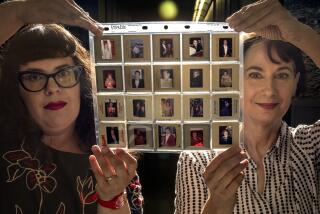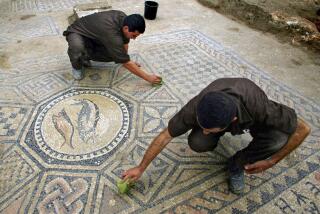Israel Warns Library, Hints at Suit Over Scrolls
- Share via
Israel warned the Huntington Library on Sunday not to release photographic records of the Dead Sea Scrolls, hinting at possible legal action if the library breaks the decades-long convention that has kept the ancient Jewish documents under the control of a small group of scholars.
Amir Drori, director of the Israeli Antiquities Authority, said the San Marino library’s decision to open its microfilm collection to other biblical scholars would constitute “both a breach of contract and of ethics.”
“We have asked them not to do this,” Drori told the Associated Press. “If they do, after we said no, we will have to consider taking additional steps. But we do not expect to have to take those steps.”
Huntington Library officials, however, responded that they have no intention of changing their plans and will open the collection without restriction to scholars beginning today.
William A. Moffett, library director, said the library is prepared to fight in court, if necessary, any attempts to block access to the photographs.
“There’s either freedom of access or not,” Moffett said. “Our position is that there should be unfettered access.”
“We have every right, and, in fact, we have an obligation (to release the collection),” he said.
The Huntington’s release of the collection breaks the 40-year research monopoly that has been held over the scrolls since they were discovered in 1947 by Bedouin shepherds in what is now the Israeli-occupied West Bank.
Inside a series of caves were hundreds of animal skin and papyrus scrolls that included every book of the Hebrew Bible except Esther and a treasure-trove of documents dating back as far as 200 BC.
The Jordanian government, which had control over the priceless documents, granted exclusive research rights to a small group of international scholars. The agreement virtually barred other researchers from examining the documents.
The arrangement continued under the Israelis, who gained control of the scrolls after the 1967 Arab-Israeli War. The actual scrolls are housed at the Shrine of the Book and Rockefeller museums in Jerusalem.
For 40 years, researchers have chafed at the barriers that have kept the scrolls in the hands of the 25 to 40 scholars worldwide who have been granted exclusive rights. The so-called “Dead Sea Scrolls cartel” has completed less than a third of the translations that it agreed 40 years ago to provide, critics say.
Drori said Sunday the Huntington Library has violated a contractual agreement that prevents the use of the scrolls without the approval of the Antiquities Authority.
But Moffett said the Huntington’s photographic record is unique. It was donated to the library by the late philanthropist Elizabeth Hay Bechtel, who was granted permission to photograph the scrolls in 1980.
Moffett said that Bechtel may have been bound not to release the documents, but the library is not.
“We’re not party to that contract,” Moffett said. “It has nothing to do with us.”
Moffett said the library has consulted its attorneys and is confident of victory in any legal confrontation.
“What we’ve done will help defuse one of the raging controversies of our generation,” he said. “We’re very comfortable with lashing ourselves to the mast.”
He said he received a short, one-page fax from the Antiquities Authority Sunday warning against release.
Moffett said he also has discussed the controversy with a top editor of the official scrolls research team, who suggested a compromise of limiting access or prohibiting scholars who examine the photographs from publishing their findings.
But Moffett said there is no room for compromise on the scrolls. “It’s too late,” he said. “It’s done.”
More to Read
Sign up for Essential California
The most important California stories and recommendations in your inbox every morning.
You may occasionally receive promotional content from the Los Angeles Times.














